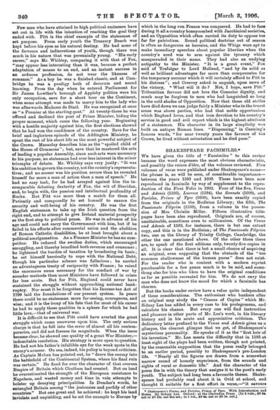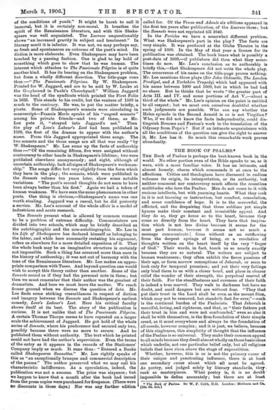SHAKESPEARE FACSIMILES.*
WE have given the title of " Facsimiles " to this review because the word expresses the most obvious characteristic, and possibly the raison d'être, of the volumes reviewed. Five volumes of verse were published under Shakespeare's name— the phrase is, as will be seen, of considerable importance— between the years 1593 and 1609. These have been now reproduced in facsimile by way of supplement to the repro- duction of the First Folio in 1902. Four of the five, Venus and Adonis (1593), Lucrece (1594), the Sonnets (1609), and Pericles, Prince of Tyre (1609), have been exactly copied from the originals in the Bodleian Library; the fifth, The Passionate Pilgrim (1599), from a volume in the posses- sion of Mrs. Christie Miller. Fifteen illustrative title- pages have been also reproduced. Originals are, of course, unattainable, sometimes even to millionaires. Of the Venus and Adonis of 1593, for instance, there is but one extant copy, and this is in the Bodleian; of The Passionate Pilgrim two, one in the library of Trinity College, Cambridge, the other the one mentioned above. Of the other three there are, to speak of the first editions only, twenty-five copies in all. It is clear that there is but a small chance of acquiring an original, even supposing that the obstacle of the "too common shallowness of the human purse" does not exist. For the reader who is content with a modern reprint purchasable for a few pence much is to be said, and some- thing also for him who likes to have the original conditions as far as possible recreated for him. We do not envy the man who does not know the mood for which a facsimile has charms.
But the books under review have a value quite independent of these considerations. The enthusiast who bankers after an original may study the "Census of Copies " which Mr. Sidney Lee has added in every case to his prolegomena, and calculate his chance. But every one will find instruction and pleasure in other parts of Mr. Lee's work, in his literary history and in his acute and appreciative criticism. The dedicatory letter prefixed to the Venus and Adonis gives us a glimpse, the clearest glimpse that we get, of Shakespeare's mysterious personality. He speaks of it as the "first heir of his invention." Mr. Lee meets the difficulty that in 1593 at least eight of the plays had been written, though not printed, by the reasonable supposition that the poem really belonged to an earlier period, possibly to Shakespeare's pre-London life. "Nearly all the figures are drawn from a somewhat narrow round of homely experience, from the sounds and sights of rural or domestic life." And the character of the poem fits in with the theory that assigns it to the poet's early youth. The subject had long been a favourite theme. Shake- speare bad probably read about it in Ovid at school, and thought it suitable for a first effort in verse,--" it savours • Shakespeare's Poems, and Pericles, Prince of Tyre. With Introduction and Notes. By Sidney Lee. Oxford at the Clarendon Press. [In 5 vols., £6 Si. net or E3 10s. net the set ; in 1 vol.. Zi 4e. net or ES 3s. net.]
of the conditions of youth." It might be harsh to call it immoral, but it is certainly non-moral. It breathes the spirit of the Renaissance literature, and with this Shake- speare was well acquainted. The Lucrece unquestionably shows "an increased gravity in subject and treatment." In literary merit it is inferior. It was not, we may perhaps say, so fresh and spontaneous an outcome of the poet's mind. Its diction is more elaborate. Even Shakespeare may have been touched by a passing fashion. One is glad to lay hold of something which goes to show that he was human. The interest which attaches to The Passionate Pilgrim is of quite another kind. It has its bearing on the Shakespeare problem, but from a wholly different direction. The title-page runs thus :—" The Passionate Pagrime. By W. Shakespeare. Printed for W. Jaggard, and are to be sold by W. Leake at the Gi eybound in Paule's Churchyard." William Jaggard was the bead of the syndicate which printed the First Folio in 1625. This stands to his credit, but the venture of 1599 is much to the contrary. He was, to put the matter briefly, a pirate. Some of Shakespeare's sonnets were circulating in manusciipt—Francis Merle speaks of his " sugred sonnets" among his private friends—and two of them, as Mr. Lee puts it, "strayed into Jaggard's net." Then the play of Love's Labour's Lost had been published in 1598, the first of the dramas to appear with the author's name. From this Jaggard appropriated three songs. The two sonnets and the three songs are all that was really "by W. Shakespeare." Mr. Lee sums up the facts of authorship thus :—" Of the remaining fifteen, five were assigned without controversy to other hands in Shakespeare's lifetime ; two were published elsewhere anonymously; and eight, although of uncertain authorship, lack all signs of Shakespeare's workman- ship." The songs differ but very slightly from the form which they have in the play; the sonnets, which were published in the Sonnets volume ten years later, show some notable variations. "The poet's second thoughts do not seem to have been always better than his first." Again we hail a token of human weakness. We have seen the same phenomenon in other poets. One thing is obvious,—Shakespeare's name was one worth stealing. Jaggard was a rascal, but he did posterity a service. Mr. Lee's account of the whole affair is a model of industrious and acute research.
The Sonnets present what is allowed by common consent to be a problem of extreme difficulty. Commentators are divided into two schools, which may be briefly described as the autobiographic and the non-autobiographic. Mr. Lee in his Life of Shakespeare has declared himself as belonging to the latter, and while here summarily restating his argument, refers us elsewhere for a more detailed exposition of it. That the whole book may be an imaginative structure is certainly not impossible. Such a thing has occurred more than once in the history of authorship ; it was not out of harmony with the tone of the Renaissance literature. Mr. Lee makes an appro- priate comparison with Tasso. And beyond question one would wish to accept this theory rather than another. Some of the Sonnets sound as if they had the personal note in them ; but then we must remember that their author was the greatest of dramatists. And here we must leave the matter. We reach firmer ground when we discuss the question of date. Mr. Lee finds some striking resemblances in respect of diction and imagery between the Sonnets and Shakespeare's earliest comedy, Love's Labour's Lost. Here his critical faculty shows itself at its best. The story of the publication is curious. It is not unlike that of The Passionate Pilgrim. A certain Thomas Thorpe seems to have repeated on a larger scale the achievement of Jaggard. He got hold of the whole series of Sonnets, where his predecessor had secured only two, possibly because there were no more to secure. And he published them without authority. The text which he printed could not have had the author's supervision. Even the terms of the entry as it appears in the records of the Stationers' Company imply as much. It runs thus : "Entered a Booke called Shakespeares Sonnettes." Mr. Lee rightly speaks of this as "an exceptionally brusque and commercial description of the poems." The author preserved what we may call his characteristic indifference. As a speculation, indeed, the publication was not a success. The price was sixpence ; but we happen to know that a month after the book had issued from the press copies were purchased for fivepence. (There were no discounts in those days.) Nor was any further edition called for. Of the Venus and Adonis six editions appeared in the first ten years after publication, of the Lucrece three; but the Sonnets were not reprinted till 1640.
In the Pericles we have a somewhat different problem. What was Shakespeare's part in the play ? The facts are very simple. It was produced at the Globe Theatre in the spring of 1608. In the May of that year a license for its publication was obtained. The book bears what is possibly a post-date of 1609,—if publishers did then what they some- times do now. Mr. Lee's conclusion as to authorship is briefly this,—that Shakespeare did not write the whole play. The occurrence of his name on the title-page proves nothing. Mr. Lee mentions three plays (Sir John Oldcastle, The London Prodigal, and A Yorkshire Tragedy) which had appeared with his name between 1600 and 1609, but in which he had had no share. But he thinks that he wrote "the greater part of Acts III. and IV. and some portions of Act V.,—about a third of the whole." Mr. Lee's opinion on the point is entitled to all respect; but we must own ourselves doubtful whether such judgments are possible. Who can say whether the Helen episode in the Second Aeneid is or is not Virgilian P Who, if we did not know the facts independently, could dis- tinguish Broome and Fenton's work in the translation of the Odyssey from Pope's ? But if an intimate acquaintance with all the conditions of the question can give the right to answer it, Mr. Lee has it. So much this remarkable work proves abundantly.















































 Previous page
Previous page